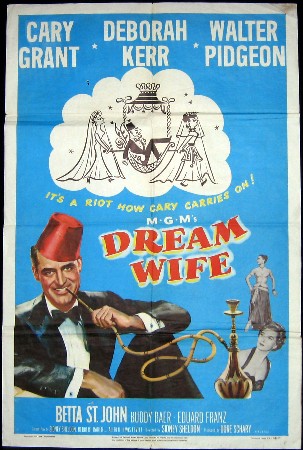
DREAM WIFE
US, 1953, 100 minutes, Black and white.
Cary Grant, Deborah Kerr, Walter Pidgeon, Betta St. John.
Directed by Sidney Sheldon.
Dream Wife is a typical romantic comedy, a piece of entertainment fluff. The strength of the film, however, lies in its having Cary Grant and Deborah Kerr in leading roles. They have romantic comedy flair and exemplify the best styles of this kind of film. Deborah Kerr and Cary Grant were leads in a much better example of this kind, Leo McCarey's An Affair To Remember. Walter Pidgeon leads a strong supporting cast. The situations are as expected - mix-ups, the battle of the sexes, humorous situations and dialogue. Not a great example of its kind, but sufficiently entertaining and an interesting look at "a typical" romantic comedy of the forties and fifties. The film was directed by the prolific best-seller author, Sidney Sheldon.
1. The humour of the title? Its meaning throughout the film and the tone that it gave?
2. How did the introduction set the humorous and satirical tone for the film? Did it carry it through?
3. How successful was this film as comedy.? How funny, how droll, how satirical? What were the main conventions of American comedy that it used? Dialogue and situations, character, satire and parody?
4. The importance of the theme of women? The background of Bukistan and the reverence for men, the place of women? The impression that this made on men? The lessons of Bukistan for American women? The contrast of Miss Effington and her career, her authority, bossing men about, her need to learn? The contrast of this with the princess and her changing into American style? What insight did this film give into the status of women today by means of humour and jokes?
5. Clem Reade - the typical American male, his status in visiting Bukistan, his relationship with Effie? His resenting his subordinate role? His courtship of the princess, his romantic notions and trying to get in touch with the princess? The wisecracks of Cary Grant’s style for this film? The chaperoning by Miss Effington? The climax of the wedding and the non-wedding? The discovery of true love? How incisive a characterization was this? How romantic and with sentiment?
6. How attractive was Miss Effington? As the typical American career woman? Her brisk efficiency? Lack of humour? Her reaction to the breaking-off of the engagement? Her instructing of the princess and of Clem? liar chaperoning the princess? The fact that she could make a mistake? Her real love for Clem? was her subordinating herself to him a weakness? Or just the end of a romantic comedy?
7. How attractive was the princess? Embodying the traditions of Bukistan and responding to American customs? Her day out on the town and inviting all the men for dates? Making mistakes and landing in prison? The satire on western ways?
8. The picture of America and industry and big business and diplomacy? The oil background? The characters like McBride? and the other diplomats?
9. How did the Bakistani men contrast with the Americans? The Khan and his customs? His reaction to the wedding?
10. How humorous were the incidents in the film? Successful comedy or slight? For instance, the discussion between the men about their happy marriages? The wisecracks and quips in the film?
11. What was the purpose in making this comedy? Merely to amuse or a purpose about the status of women?
12. What did the film ultimately have to say about the relationships of man and woman, the status of women. American culture? Its contrast with eastern cultures, American values?